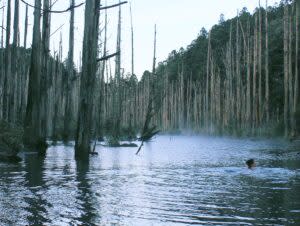老外看台灣/台裔加籍作家重新認識台灣 曝創作靈感來自多重身份
【看CP學英文】隨著春節的到來,許多移居海外的人會利用長假期回家過節。
During the Chinese New Year holiday, many second-generation immigrants try to reconnect with their roots.
《Two Trees Make a Forest》作家李潔珂 (Jessica Lee) 就是其中一位,身為二代新移民,她的家人在她出生前就從台灣移民至加拿大。
Jessica Lee, author of “Two Trees Make a Forest” is one of them as her family moved from Taiwan to Canada before she was born.
與The China Post訪談中,李潔珂表示童年大部分時間在加拿大渡過,沒有認真研究過母親和祖父母的家鄉,直到後來外公患有阿茲海默症才開始尋找更深的連結。
Lee told The China Post that she spent most of her childhood in Canada and never really asked questions about her family, until later in adulthood when her grandfather developed Alzheimer’s disease.
隨著病情惡化,開始失去語言能力的外公最後只聽得懂中文,導致和孫女的溝通出現嚴重的問題。
As the illness progressed, he began to lose certain language abilities and was later only left with speaking only Mandarin, leaving a gap in communication between him and his granddaughter.

外公去世後,李潔珂的母親意外的發現一封外公在離世的前幾天所寫的信,裡面紀錄了當年在台灣當空軍和遇見太太的回憶。
After her grandfather’s passing, Lee’s mother stumbled on a sealed letter written by him during his last few days, documenting his former life while in the air force in Taiwan, including his experience during the wars and meeting Lee’s grandmother.
然而,因為病況不佳,外公的文筆有時不連貫,讓她下定決心完成外公的故事,希望藉此助她重新建立更多與台灣的聯繫,重新定義自己的身份定位。
However, as the disease had taken a toll on him, the writing was inconsistent at times, which led Lee to decide in setting out to finish her grandfather’s story, hoping that it would help reconnect her to something more and give more definition to her identity.
她將那封信視為開啟祖父母故事的邀請函,並開始撰寫《Two Trees Make a Forest》,爾後成了一部紀錄台灣自然、旅遊寫作和回憶錄的混合型作品。
Deeming the letter an invitation to “reopen the folder of trying to tell their story,” Lee began composing the “Two Trees Make a Forest” which would later be a hybrid work that reads like a memoir doused in nature and travel writing of Taiwan.

根據李潔珂所述,書中探討到「移民」和「家鄉」等主題,特別針對因居住過世界各地,經常搬遷而不確定自己屬於哪裡的讀者。
According to Lee, the book mainly focuses on topics such as migration and what “home” means, in particular to those who move through different places and aren’t entirely sure where they belong.
「我認為,對我而言,寫這本書的過程其實讓我更清楚了解自己與台灣的關係,以及定義我和這塊土地之間的連結。」
“I think, for me, writing the book was actually the process of figuring out how I identified in relation to Taiwan and what my relationship was,” Lee said.
撰寫的過程讓她重新認識台灣,結合了祖父母對台灣的回憶和自己的親身體驗,將其匯集在一起。
Through writing the book, Lee began a re-introduction to Taiwan, combining her grandparents’ and parent’s versions of Taiwan with her own.
她說:「這本書其實是想讓大家了解,我們可以在多個地方找到歸屬感。」
“The book was really an exercise in saying, we can find a sort of sense of belonging, that is plural, and that includes many places,” Lee added.
她也在寫作過程更加了解台灣這塊土地、語言,同時也製造了很多美好的回憶,撲出自己「回家」的路。
It was through this process that Lee came to realize that in getting to know the land, the language and creating memories, she also saw a path into a kind of belonging.

她相信自己不需要被定義成「加拿大人」、「英國人」、或是「台灣人」;她堅信自己不需硬要做一個選擇,認為每個人都可以有多重身份。
Lee believes she shouldn’t be defined as merely Canadian, British or Taiwanese; instead, she stands firm that she doesn’t have to choose and supports the idea that everyone can have multiple layers to their identities.
她同時透露,她並不想要只寫家人的故事,而是將主題擴大到呈現家庭的故事是如何因為台灣的歷史、政治事件而成為今日的她。
Lee also revealed that she didn’t want to just write about family in her book, and instead, scaled it up to include how family stories tie into larger political and historical events, which in this case is the backdrop of Taiwan.
「語言」在她的故事中也是一大主題,她於2017年抵達台灣,於三個月中體驗當地生活、搜集相關資料,後來飛回到當時居住的柏林完成撰稿。
Language also played a big part in her story, and Lee traveled to Taiwan in 2017 and stayed for three months to do her research while later returning to Berlin, Germany where she was staying at the time to finish her book.

對她而言,在了解語言的過程中,可以讓自己對文化的理解更多元。她舉自己的母親為例,表示有時她以中文敘述某事再將它翻成英文後,中間有一層意義會在翻譯中消逝,因此她認為要確實挖出自己的歷史,學會中文是不可或缺的。
To Lee, in getting to know the language, one can see oneself as more “plural.” Drawing an example from her mother, Lee said that sometimes when she speaks in Mandarian, a dimension may get lost in between; therefore, Lee believes fluency in the language is integral to holding on to as much as she could.
當被問及台灣對現在的她來說代表著什麼,李潔珂表示台灣是有很多層次、複雜的地方,同時也蘊藏著絕美的大自然景觀。
When asked about what Taiwan means to her now, Lee feels it’s about Taiwan’s layers, complexity and nature.
「要認識台灣就是要走進她的山林中,擁抱大自然,看看一整片的藍天和夕陽畫過山林的畫面。這些場景都非常夢幻。」
“It’s about getting out into the mountains, getting out into nature, being able to sort of see the big skies and you know, the light of the mountains across the horizon. It’s magical.”

When asked about what Taiwan means to her now, Lee feels it’s about Taiwan’s layers, complexity and nature. (Photo courtesy of Jessica Lee)在她看来,台灣有非常多元的文化,比一般人想像的還複雜。因此,她希望有一天若需要向自己的孩子介紹台灣這塊土地,她必定會帶著孩子們親自來探索台灣。
To her, Taiwan is very multicultural with layers and more complexity than most would think. In this way, she hopes that one day if she were to introduce Taiwan to her kids, she would bring them to explore Taiwan personally.

「這裡有這麼多不同語言,有這麼豐富的社區,真的很特別。我們無法以單純一個字形容台灣,想要真正認識、了解她就必須接受她的多元性。」
“There’s so many languages, there’s such a sort of wealth of community, that’s really special […]There’s no simple answer to what Taiwan is, and you sort of have to go and just embrace that complexity.”
《Two Trees Make a Forest》即將於2022年二月出版繁體中文版。
“Two Trees Make a Forest” will soon be translated into a Chinese version, which is set to release in February 2022.

更多 ChinaPost 新聞
老外看台灣/老外驚見土狗霸氣坐機車 英姿讓他大讚:台灣獨有!|Taiwan dog catches foreign photographer’s eye with cool motorcycle-riding pose
畫家曬超Q毛小孩防疫海報 日本貓奴讚:動作超到位!|Japanese cartoonist shares cute dog, cat virus prevention posters
內湖人不用出城也有花海!4萬株花朵打造最美後花園|Visit Neihu’s most #Instaworthy sea of flowers this weekend

 Yahoo奇摩新聞
Yahoo奇摩新聞 